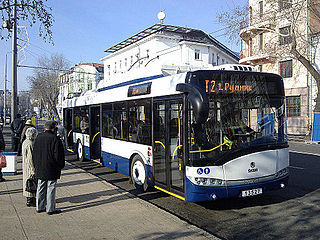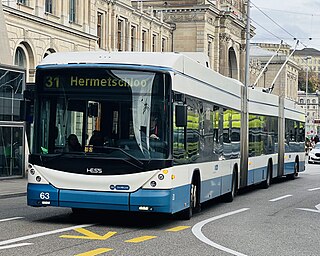| Sumqayit trolleybus system | |
|---|---|
| Operation | |
| Locale | Sumqayit, Azerbaijan |
| Open | 28 April 1961 |
| Close | 31 December 2005 |
| Status | Closed |
| Lines | 8 (max) |
| Infrastructure | |
| Stock | 13 (recent) |
| Statistics | |
| Route length | 48.9 km (30.4 mi) (max) |
The Sumqayit trolleybus system was a system of trolleybuses forming part of the public transport service in Sumqayit (alternatively transliterated as Sumgait), the third most populous city in Azerbaijan, for most of the second half of the 20th century. [1]
The system was opened on 28 April 1961. [2] At its height, it consisted of eight lines. The only remaining line was closed on 31 December 2005 (i.e., with effect from 1 January 2006). [3] [1]
The line operating immediately before closure of the system was: [1]
6. Торговый центр (Shopping Centre) - Микрорайоны (Neighbourhoods)
The Sumqayit trolleybus fleet in the period leading up to the system's closure was made up of 13 vehicles of type ZiU-9.
Previously, the system had used trolleybus vehicles of the following types: [1]

A trolleybus is an electric bus that draws power from dual overhead wires using spring-loaded trolley poles. Two wires, and two trolley poles, are required to complete the electrical circuit. This differs from a tram or streetcar, which normally uses the track as the return path, needing only one wire and one pole. They are also distinct from other kinds of electric buses, which usually rely on batteries. Power is most commonly supplied as 600-volt direct current, but there are exceptions.

Trolza, formerly known as the Uritsky factory or simply Uritsky, was a trolleybus manufacturer in Russia, located in Engels, Saratov oblast.

The first trolleybus vehicle in Russia was built in Saint Petersburg in 1902 at Frese machine-building factory. It utilised a carriage-type current collector like the early von Siemens prototypes. There was no attempt to organize passenger or cargo services at this time.

The Burgas trolleybus system forms part of the public transport network of the Black Sea city and municipality of Burgas, the fourth most populous city, and the largest and most important port, in Bulgaria.

The Ulaanbaatar trolleybus system forms part of the public transport network in Ulaanbaatar, the capital city of Mongolia. It is Mongolia's only trolleybus system.

The Yerevan trolleybus system forms part of the public transport network in Yerevan, the capital city of Armenia. Since the closure of the Gyumri trolleybus system in 2005, it has been Armenia’s only trolleybus system.

The Córdoba trolleybus system is part of the public transport network in Córdoba, the capital city of Córdoba Province, Argentina.

The Tehran trolleybus system serves Tehran, the capital city of Iran. Opened in 1992, it is the only trolleybus system ever to have existed in Iran. At its maximum extent, the system had five routes, served by at least 65 trolleybuses. The system closed in 2013, but reopened in 2016 with one route and a fleet of around 30 modernised Škoda 15Tr.

The Fribourg trolleybus system forms part of the public transport network in Fribourg, capital of the canton of Fribourg, Switzerland. The system also serves the neighbouring municipalities of Villars-sur-Glâne and Givisiez, using one line in each case.

The La Chaux-de-Fonds trolleybus system forms part of the public transport network in La Chaux-de-Fonds, in the canton of Neuchâtel, Switzerland.

The St. Gallen trolleybus system forms part of the public transport network of St. Gallen, the capital city of the canton of St. Gallen, Switzerland.

The Plovdiv trolleybus system was a part of the public transport network of the city and municipality of Plovdiv, the second most populous city in Bulgaria.

The Zurich trolleybus system is part of the public transport network of Zurich, Switzerland. Opened in 1939, it combines the Zürich S-Bahn, the Zurich tramway network and Zurich's urban motorbus network to form an integrated all-four style scheme.
As of 2012 there were around 300 cities or metropolitan areas where trolleybuses were operated, and more than 500 additional trolleybus systems have existed in the past. For complete lists of trolleybus systems by location, with dates of opening and closure, see List of trolleybus systems and the related lists indexed there.
The Mingachevir trolleybus system was a system of trolleybuses forming part of the public transport arrangements in Mingachevir, the fourth most populous city in Azerbaijan, for about 15 years at the turn of the 21st century.

The Sumqayit tramway was a tramway forming part of the public transport system in Sumqayit, the third most populous city in Azerbaijan, for more than 40 years in the second half of the 20th century.
The Ganja trolleybus system was a system of trolleybuses forming part of the public transport arrangements in Ganja, the second most populous city in Azerbaijan, for most of the second half of the 20th century.
The Nakhchivan trolleybus system was a system of trolleybuses forming part of the public transport arrangements in Nakhchivan, the capital of the eponymous Nakhchivan Autonomous Republic of Azerbaijan, for nearly 20 years from 1986.
The Baku trolleybus system was a system of trolleybuses forming part of the public transport arrangements in Baku, the capital city of Azerbaijan, for about 65 years from 1941.
Khimki trolleybus is a trolleybus system in Khimki, Moscow Oblast. Opened on 24 April of 1997... It is operated by Municipal Unitary Enterprise "Khimkielektrotrans".
![]() Media related to Trolleybuses in Azerbaijan at Wikimedia Commons
Media related to Trolleybuses in Azerbaijan at Wikimedia Commons